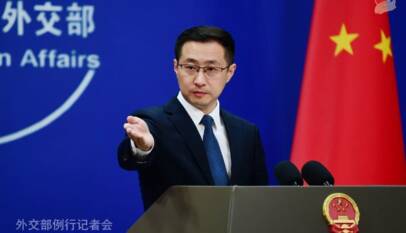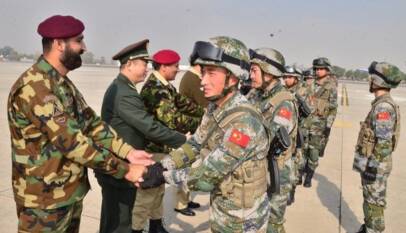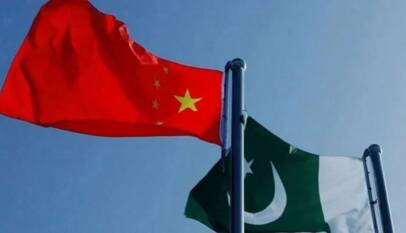DG ISPR terms CPEC as the game changer and a tool of regional connectivity
Major General Babar Iftikhar, the spokesperson of the country’s military while commenting on the importance of CPEC said that it is a game changer for the entire region and after its completion, Pakistan will become a hub of connectivity for the whole region. He said that this project has the potential to bring prosperity to the whole region. Moreover, he said that CPEC is safe and moving forward due to effective security measures taken by Pakistan. The Chinese, he said, are also satisfied with the security arrangements made by Pakistan to protect CPEC. He said that no scheme of adversaries in this regard will succeed.
Major General Babar Iftikhar, the spokesperson of the country’s military, has said India is targeting the international image of Pakistan when they try to target the flagship project of the Belt and Road Initiative, the China-Pakistan Economic Corridor (CPEC).
In an interview with Global Village Space, the military spokesperson said terrorists are being used by New Delhi to target the project and the manpower associated with CPEC’s construction, however, he said the measures taken by Islamabad to safeguard the project have proven to be effective and India has “not been able to retard the progress of this project”.
In November, the country’s top diplomat and the military spokesperson presented a dossier detailing India’s involvement in terror attacks in Pakistan during the media conference. Multiple video clips and audio clips, along with documents, were presented during the media conference of Indian handlers and terrorists communicating with each other and Indian intelligence handlers passing on instructions to terrorists in Pakistan.
When asked about the increase in ceasefire violations along the Line of Control (LoC), Maj Gen Iftikhar said New Delhi is “always looking for some kind of an excuse to raise the temperature”. He added that false flag operations, where India tries to pin the blame on Pakistan, is a norm.
After the suicide bombing in occupied Kashmir’s Pulwama, India immediately blamed Pakistan for the attack in which at least 40 Indian security personnel were killed. Indian media and government officials, without any evidence, blamed Islamabad for the worst attack in the occupied valley in decades. The botched Balakot airstrike by the Indian Air Force happened soon after the attack.
“What is there? What have they found, have they shared anything with the rest of the world? No. This is what I am trying to say, whatever is happening inside in Indian Illegally Occupied Jammu & Kashmir, frankly, they are in a state of denial, and that is causing them the kind of trouble that there is,” said the military spokesperson referring to the recent Nagrota incident in occupied Kashmir.
Referring to fake news and propaganda originating out of India, the military spokesperson said it is a “major challenge”, especially on social media. He, however, said the “best way to handle this is transparency, the best way to handle this is to not leave any information voids, the best way to handle this is passing on credible information, and that is exactly what we are trying to do here”.
He said on social media when the origin of fake news and propaganda is looked into, it is found that most of the accounts are Indian in origin. “Only recently they have unearthed a major effort by the Indians in the form of EU Disinformation lab and the way they’ve been trying to prop up different issues across the world. So, unfortunately, it is a major onslaught and a major part of the fifth-generation warfare. In the case of Pakistan, I think that Pakistan is being subjected to this fifth-generation warfare and hybrid applications in a massive way, and we are aware of that.”
“When we talk of fifth-generation warfare, my understanding is that you use all elements of national power, within a particular state to concentrate on maybe two or three major spheres.”
Maj Gen Iftikhar added that in Pakistan’s case, the country’s economy is being targeted and the other area of focus is the information domain.
“In the information domain, pick out one little incident which has anything to do with Pakistan and specifically to do with Pakistan Army and look at how it gets viral. I mean there have been several hashtags in the last six months that were even reported, I mean very trivial news, which were even reported by international news organizations, and they were pushed vehemently by the Indian accounts.”
Elaborating further, DG ISPR said New Delhi has been targeting the country in the “diplomatic domain, in the information domain, of course, the military engagements on the Line of Control (LOC), in the economic domain, financially and in lawfare”.
The western border
Maj Gen Babar Iftikhar stated that the aim of the government is better border management in the country’s west and said 83pc of the Pak-Afghan border has been fenced and added that the fencing would be completed by the end of the current month.
“As far as the Western border is concerned, our aim has been to ensure better management of this border. So after we were through with the operations that we were doing, right now there is not a single inch of land along the Western border which is not being manned by our soldiers.”
When asked about the status of fencing on the border with Iran, the military spokesperson revealed that 30pc of the Pak-Iran border has been fenced and the process will be completed by December 2021.
Not giving a specific number, Maj Gen Iftikhar said fencing has reduced terrorist incidents in Pakistan have “decreased massively”.
He also said that Islamabad does not blame Kabul for the attacks originating from Afghan territory as Pakistan understands the capacity issues that Afghanistan faces.
“There has been a massive effort by the Indian side to create some kind of disturbance inside Pakistan, especially in the border regions. Again, they are also trying to target the fencing over there, the way we are trying to fence the border.”
Referring to the ongoing Afghan peace process, DG ISPR reiterated that Pakistan will continue to facilitate the peace talks and Islamabad remains optimistic for its future.
“We have tried to facilitate this to every extent that we could, and everybody has acknowledged that, the Afghan government, the US government, they all acknowledged that Pakistan has played the most positive role in trying to bring them on the table, try to facilitate the talks and to take this peace process to a logical conclusion, so that is our role in it, and that is what we will continue doing.”
Fight against Covid-19
Praising the joint civil-military run NCOC, the spokesperson said “a lot of capacity building” has taken place since the start of the pandemic and Pakistan Army has assisted the civil government whenever the need has arisen.
He also expressed satisfaction regarding the handling of the second wave of the pandemic. “The second wave as it is coming, we should be tackling it well.”
“And as we go through it, I must acknowledge the role of the front line health workers, who have fought through this, and who are again on the front lines. I would also like to make a special mention of how the media has helped in educating the masses about what this pandemic is all about, and how to keep yourselves safe in these circumstances.”
He, however, urged caution and said the people should be extremely careful during the second wave of Covid-19.
CPEC’s Success Story: $25 Billion Invested Across 38 Completed Projects
ISLAMABAD: A total of 38 projects worth over $25 billion have been completed and 23 develo…












